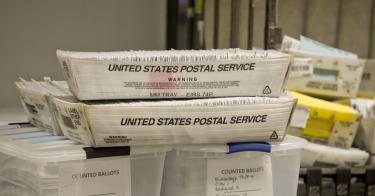According to reports filed with Congress by the U.S. Election Assistance Commission, in the last four federal elections, Michigan election officials rejected more than 25,000 absentee ballots returned to them by voters, while the fate of many more absentee ballots is “unknown.” They may have ended up in a landfill or gotten lost in the mail.
So why are Michigan’s secretary of state, many elected officials, and organizations like the League of Women Voters encouraging even more reliance on a method of voting that is:
- Outside the supervision—and protection—of election officials?
- More prone to intimidation and pressure being brought on votes in their homes in the absence of election officials and election observers and where electioneering is not prohibited, like it is in polling places?
- More subject to theft, forgery, and alteration of ballots?
- Prone to a high rejection rate?
Why resort to a voting method that resulted in 25,318 absentee ballots of Michigan voters not being counted in the 2012, 2014, 2016 and 2018 elections because they did not completely comply with state rules when they were received? Unlike in a polling place where any problems can be resolved so the ballot will be counted.
Why are they pushing a method of voting that depends on the vagaries of the postal system, the same system that regularly misdelivers mail to my house for folks who live elsewhere or for the family that owned my house almost 20 years ago? Perhaps they haven’t read the story about the tubs of absentee ballots in Wisconsin that were found in a mail processing facility after the state’s primary, having never been delivered.
The Heritage Foundation maintains an election fraud database that provides a sampling of proven fraud cases from around the country. It is filled with absentee ballot cases, many of which illustrate the ways in which voters are pressured and intimidated or have their ballots stolen or filled out for them. If you have any doubts that this happens, take a look at a mayoral primary race in East Chicago, Ind., in 2003. In Pabey v. Pastrick, the Indiana State Supreme Court overturned that election.
Why? Because of “voluminous, widespread” fraud that “perverted the absentee voting process.” One of the candidates and his staff targeted “voters that were first-time voters or otherwise less informed or lacking in knowledge of the voting process, the infirm, the poor, and those with limited skills in the English language.” When these voters received their absentee ballots, they were illegally “assisted” in completing the ballots, meaning they were told how to vote. While there are election officials at neighborhood polling places, there were no election officials in their homes to prevent that from happening.
Think all of this is old news? How about the mayor of Gordon, Ala.? He was removed from office last year after his conviction for absentee ballot fraud in an election he won by only 16 votes.
What about the lawsuit against Detroit that was filed by the Public Interest Legal Foundation because the city has not kept up the accuracy of its voter registration roll? PILF found almost 5,000 individuals who are registered more than once, and more than 2,500 voters who are dead. One wonders how many of them will send in the absentee ballot request forms that are being sent out to all registered voters.
No one disputes that we need absentee ballots for those who are too disabled, too ill, or have some other valid reason why they can’t make it to the polls. But the states are all reopening.
There is no reason why we can’t be back in our polling places voting in November with the same precautions we’re seeing every day in our grocery and drugstores. Where no candidate, political gun-for-hire, or party official can steal our ballot or tell us how to vote. And where we can put our ballot into the ballot box instead of depending on the U.S. Postal Service to—maybe—deliver it so it gets counted.
This piece originally appeared in The Detroit News



